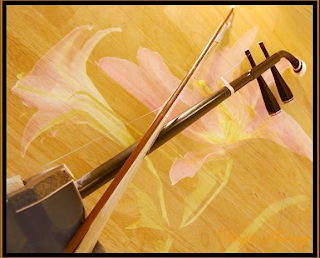五四运动时期,刘天华融合欧洲的音乐理论、演奏技巧,根据中国民间音乐特性及借鉴小提琴,将二胡定弦为d、a,并对二胡的演奏技巧进行革新,扩展二胡的表現力,并且为二胡创作《月夜》,《烛影摇红》多首独奏曲。著名二胡民间艺人华彦钧(阿炳)创作的《二泉映月》;作曲家黄海怀创作的二胡独奏曲《赛马》经常奏响在国际舞台。現代二胡作品出现,有《豫北叙事曲》、《三门峡畅想曲》、二胡協奏曲《长城随想》等。1980年到2000年以后,已出版的二胡独奏曲达数百首,并开始发展叙事曲,协奏曲,狂想曲等大型二胡曲。
1950年至1960年间,上海民族乐团、中央民族乐团等模仿交响乐团的职业民族乐团出现,增加对二胡专业的需求。
The erhu can be traced back to instruments introduced into China more than a thousand years ago. It is believed to have originated from the Xi people of Central Asia, and have come to China in the 10th century.
The first Chinese character of the name of the instrument (èr, two) is believed to come from the fact that it has two strings. An alternate explanation states that it comes from the fact that it is the second highest huqin in pitch to the gaohu in the modern Chinese orchestra. The second character (hú) indicates that it is a member of the huqinfamily. The name huqin literally means "barbarian instrument", showing that the instrument likely originated from regions to the north or west of China inhabited by non-Han peoples.
Other solo pieces include Er Quan Ying Yue (1950, Moon Reflected on Second Spring) by A Bing, Sai Ma (Horse Racing) by Huang Haihuai, Sanmenxia Changxiangqu (1961, Sanmen Gorge Capriccio) by Liu Wenjin. Most solo works are commonly performed with yanqin accompaniment.In addition to the solo repertoire, the erhu is also one of the main instruments in regional music ensembles such as Chinese opera ensembles, and the modern large Chinese orchestra.

没有评论:
发表评论